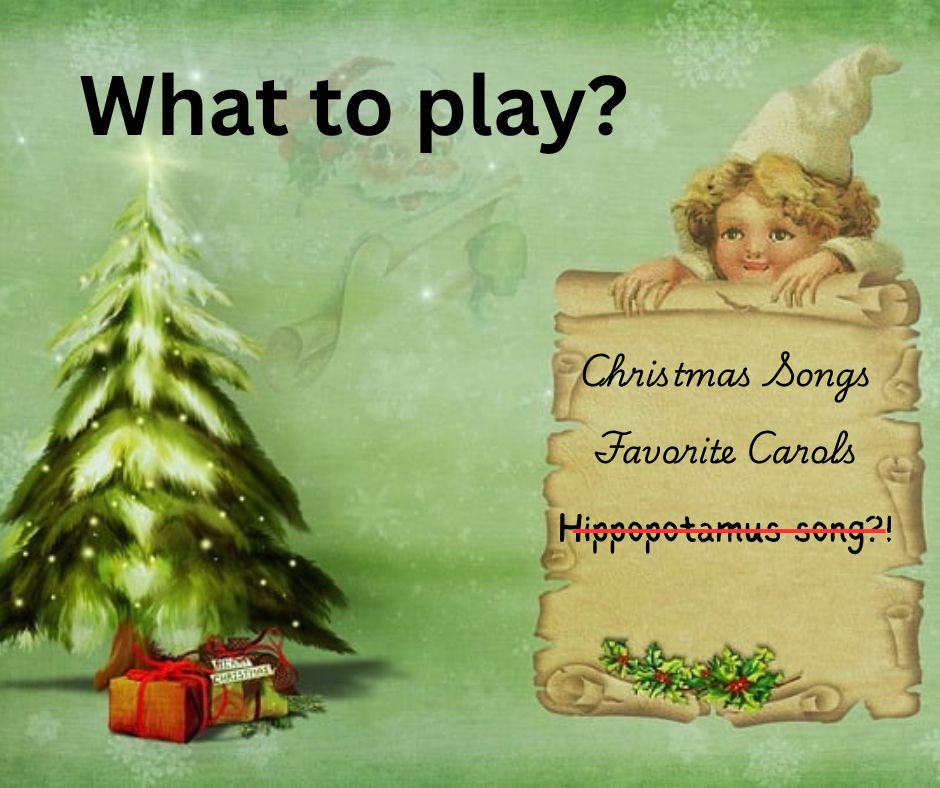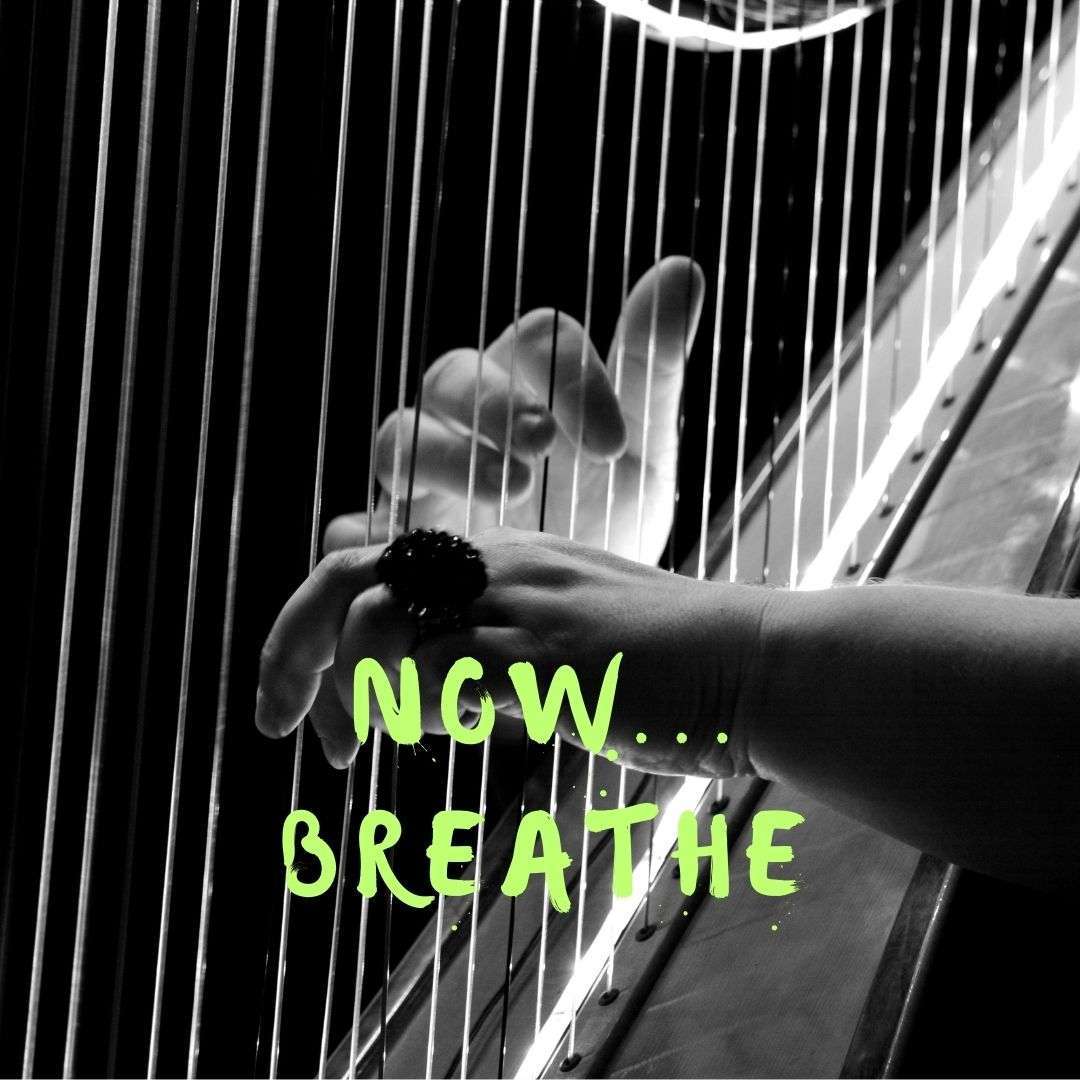You know that the holidays will be here soon. Probably sooner than you want but certainly no sooner than every year. And you know that everyone will want you to play for something – a party, a tea, church, or family around the tree.
And, since it comes every year, you’d think we’d have a go-to answer for what to play. And yet, every year, it starts anew – what to play? In what order? For how long? So many questions – what’s the right answer?
Well, here are 8 simple steps to organize your holiday program which can help you focus your practice and feel more confident that you’ll give your audience a lovely experience:

1. Review and refresh all the holiday music you have learned before. No tune is too insignificant to be part of this list! This is music you already have worked through and will be able to burnish relatively quickly so you can have time to spend on learning new stuff!
2. Decide how long you’re going to play (or how long they have asked you to play). This will give you some idea of how much music you will need. Or it will give you the opportunity to tell your expectant enquirer that, while you cannot play for 24 hours, you would be happy to play for 24 minutes (or whatever). The rule of thumb is about 3 minutes per tune – which is definitely true for Christmas carols since they all have at least three sets of verses and if you include an intro, a bridge-y bit and a coda of some kind, you’ll be there!
3. Define the type of holiday music you need. Are you playing a church and need all carols? Are you playing a care home and need “holiday music” (heavy on Frosty the Snowman and The Christmas Song (Chestnuts Roasting on an Open Fire)? Are you playing for children (and so need Up on the Rooftop and Ruldolph and not Have Yourself a Merry Little Christmas)? Are you playing for your family under the tree (and so need each person’s favorite, regardless of type)? Will you need to add well-known carols to fill your time? If you know your time and your rule of thumb, do you have enough tunes or do you need to start learning?
4. What keys are you playing in? While I love Sylvia Woods’ 50 Christmas Carols book, they’re almost all in the same lever setting (note they’re not all in the same key, which can get boring fast, but many are or are in varying modes). A little tonic movement will help keep your audience engaged.
5. To sing or not to sing. Are you hoping that your audience will sing along as you play? If so, you will want to play things they are likely to know the words too (and consider handing out song sheets). Also, having people sing along with you is NOT the same as imagining them singing while you practice in your silent practice room! It can be very discombobulating if you’re not used to it. If you do not want them to sing along, you might want to play less well-known music or be “artsy” in your arrangements, being so rubato that they can’t really tell when to sing!
6. What order do you want the music to occur? If you are playing a background party gig, you might order the tunes to minimize the number of times you have to change levers. But if you’re playing a showcase, you will want the music to make sense to the ears of your audience. There is a bit of an art to this, but consider the pace of the tunes, the “feel” of the mode (old tunes are often in minor keep making them feel like velvet drapes while many modern songs are like sheers – light and airy. There is no sacred order, but you’ll know it when you hear it. I often go from somber and dark to festive and light starting with the heavy, old, minor carols and working up to the ones that sound more festive. Not sure what I mean? I might start with Let All Mortal Flesh Keep Silent and end with Ding Dong Merrily on High. Both are beautiful Carols, but Let All Mortal definitely has the velvet feel while Ding Dong clearly is “skipping” like a six-year-old! If you’re playing a longer, more diverse program, don’t keep all the old tunes together and then clump the new songs. It’s a pick-and-mix so be sure you’re picking and mixing! No matter what, record your program and listen for any jarring changes – that tells you to rearrange the order of the tunes.
7. Time yourself – because you don’t want to decide you’re fine for an hour and then find out you played all your music in 10 minutes!
8. From the beginning, practice all the tunes. You want to play things you’re comfortable with. A little stretch is a good idea, but at this point learning all new music is not your safest strategy. Keep in mind though, that the music you have learned in previous years will serve you well. Even if you don’t remember it, you do and it will come back relatively quickly and with less practice than it feels like the first time you play it this year!
Finally – remember that it’s the holidays and it’s a harp – everyone is going to love what you play and be delighted with you for sharing your music! What steps do you follow to get your program ready for the holidays? Share them in the comments!
COMMENTS FROM YOU:
From Steve: I like your steps. They are good practical advice than help create a fast action plan. I like how this strategically leads to more playing (practice) and readiness rather than hem-hawing and indecisiveness. Nice timely topic!
Thanks Steve!








